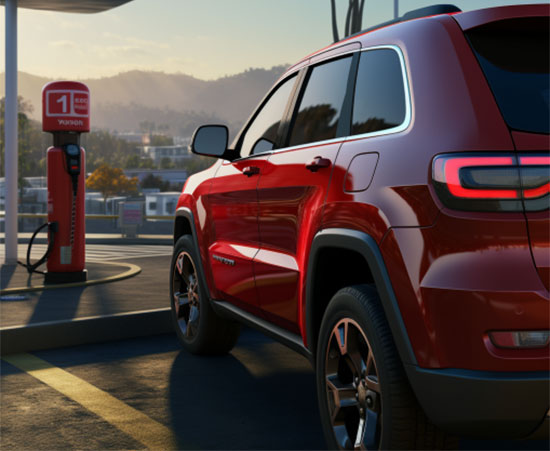While it’s true that your Jeep Grand Cherokee offers rugged reliability, you may encounter fuel pump issues that can disrupt your driving experience. If you’ve noticed your SUV stalling or sputtering, it’s possible the fuel pump is to blame. These problems typically manifest through difficulty starting, a loss of power, or an engine that unexpectedly cuts out.
Troubleshooting these issues early is key to maintaining your vehicle’s performance and preventing further damage.
Remember, fuel pump problems don’t just affect your ride’s efficiency; they can also compromise safety.
Stay ahead of the game by understanding the symptoms, troubleshooting effectively, and knowing when it’s time to call in a professional for your Grand Cherokee’s fuel pump woes.
Contents
Some Tips
- Symptoms of fuel pump issues include engine sputtering, vehicle stalling, difficulty starting, loss of power, and the check engine light illuminating.
- Troubleshooting fuel pump issues involves checking fuel pressure, verifying recalls, inspecting power and ground terminals, and replacing external relays or pump connectors.
- Addressing electrical concerns involves promptly addressing any issues, checking the fuel pump relay, verifying recalls for the relay, and seeking advice from forums.
- It is important to seek professional help when experiencing fuel pump issues, when problems persist after a recall repair, for certain electrical issues, and for models between 2014 and 2020 to prevent further damage.
Identifying Common Symptoms
In your Jeep Grand Cherokee, if you notice the engine sputtering or the vehicle stalling, these may be telltale signs of a malfunctioning high-pressure fuel pump.
When diagnosing Fuel Pump Failure, it’s crucial to assess the fuel system’s integrity comprehensively. A compromised fuel pump relay can intermittently disrupt power, leading to sporadic starts. If your Grand Cherokee doesn’t start right away or the check engine light illuminates, these symptoms warrant further investigation.
Low pressure within the fuel system can exacerbate starting issues and may necessitate the examination of an external relay.
Additionally, ensure your vehicle isn’t subject to a recall addressing the high-pressure fuel pump; a VIN check will confirm the status and necessary corrective action.
Troubleshooting Fuel Pump Issues
Begin troubleshooting your Jeep Grand Cherokee’s fuel pump issues by checking the fuel pressure with a gauge to confirm it meets the required specifications. If the pressure is below the manufacturer’s recommendation, consider the recall issued for the 2020 model year, particularly if you own a Grand Cherokee Overland.
The National Highway Traffic Safety Administration (NHTSA) mandates safety compliance, and your vehicle’s VIN can verify recall repair completion.
A defective fuel pump can manifest as stalling or sputtering—indicators of an inadequate fuel supply. Investigate the power and ground terminals for corrosion or damage, which can impede proper pump function. In some cases, replacing external relays or pump connectors rectifies the issue.
Always prioritize safety when examining fuel system components to prevent hazards.
Addressing Electrical Concerns
You’ll need to address any electrical concerns swiftly, as they can significantly impact your Jeep Grand Cherokee’s fuel pump performance and overall safety. When diagnosing issues, consider the fuel pump relay—external to the TIPM (Totally Integrated Power Module)—as a potential culprit. The National Highway Traffic Safety Administration (NHTSA) has documented cases where a defective relay can lead to stalling, which compromises safety.
If there’s a recall done, ensure it’s completed promptly. Consult the Fora platform, which includes forums at 111 Peter Street, for shared experiences and advice on Grand Cherokee electrical issues.
When to Seek Professional Help
When your Jeep Grand Cherokee shows any signs of the fuel pump issues outlined, it’s essential to consult a professional immediately. If you’ve noticed stalling or a loss of power, and a Recall was done months ago, yet problems persist, it’s critical to seek professional help.
Even after the first recall, if your Grand Cherokee exhibits rearview camera glitches or braking irregularities, such as unresponsive brake pedals or cruise control faults, a diagnostic expert should be engaged.
For long crank issues or unexpected loss of drive power, particularly in models between 2014 and 2020, professional assessment is imperative to prevent further damage.

Preventative Maintenance Tips
Ensure your Jeep Grand Cherokee’s longevity by regularly checking for any fuel pump recalls or safety notices. To maintain optimal performance over time, make sure to incorporate these preventative maintenance tips:
- Monitor your Grand Cherokee for any official recalls from the manufacturer, and promptly attend to these notices.
- Every two years, replace the fuel filter to prevent debris from damaging the high pressure fuel pump.
- Keep an eye on the fuel system; a failing pump may exhibit stalling or power loss.
- Regularly consult forums for your Grand Cherokee model; an older thread may receive a response with updated information.
Staying vigilant with these steps will help ensure your Grand Cherokee runs smoothly for a long time.
Always consult with a certified technician from Jeep Inc. or a trusted automotive service provider for detailed diagnostics and maintenance.
Final thoughts
You’ve learned to recognize the telltale signs of a failing fuel pump, from stalling to power loss. Troubleshooting these issues requires a methodical approach, considering both mechanical and electrical factors.
If symptoms persist, it’s imperative to consult with a technician. Adhering to a strict maintenance schedule can mitigate future problems.
Ensure your Jeep Grand Cherokee’s reliability by staying vigilant with these tips and addressing concerns promptly.
